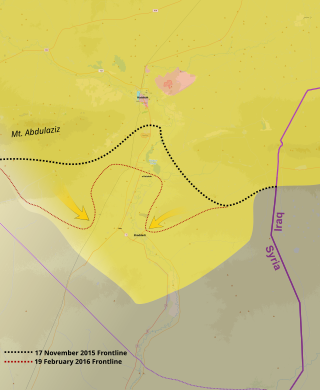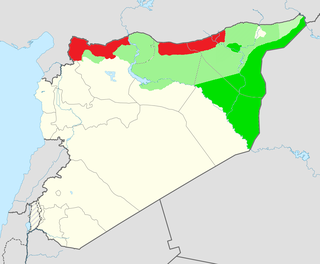
The Syriac Military Council is an Assyrian military organisation in Syria, part of the Syrian Democratic Forces. The establishment of the organisation was announced on 8 January 2013. According to the Syriac Military Council, the goal of the organisation is to stand up for the national rights of and to protect Assyrians in Syria. It operates mostly in the densely populated Assyrian areas of Al-Hasakah Governorate, and is affiliated to the Syriac Union Party.
The Islamic State of Iraq and the Levant (ISIL) is proscribed as a terrorist organisation by the United Kingdom. British citizens have fought as members of the group, and there has been political debate on how to punish them. On 26 September 2014, Parliament voted to begin Royal Air Force airstrikes against ISIL in northern Iraq at the request of the Iraqi government, which began four days later, using Tornado GR4 jets. On 2 December 2015, the UK Parliament authorised an extension to the Royal Air Force airstrike campaign, joining the US-led international coalition against ISIL in Syria. Hours after the vote, Royal Air Force Tornado jets began bombing ISIL-controlled oilfields.

The Women's Protection Units or Women's Defense Units is an all-female militia involved in the Syrian civil war. The YPJ is part of the Syrian Democratic Forces, the armed forces of Rojava, and is closely affiliated with the male-led YPG. While the YPJ is mainly made up of Kurds, it also includes women from other ethnic groups in Northern Syria.
The condition of human rights in the territory controlled by the Islamic State (IS) is considered to be among the worst in the world. The Islamic State's policies included acts of genocide, torture and slavery. The United Nations Commission on Human Rights (UNCHR) stated in November 2014 that the Islamic State "seeks to subjugate civilians under its control and dominate every aspect of their lives through terror, indoctrination, and the provision of services to those who obey". Many Islamic State actions of extreme criminality, terror, recruitment and other activities have been documented in the Middle East.
The Bethnal Green trio are Amira Abase, Shamima Begum, and Kadiza Sultana, three British girls who attended the Bethnal Green Academy in London before leaving home in February 2015 to join the Islamic State. According to the Institute for Strategic Dialogue, they were among an estimated 550 women and girls from Western countries who had travelled to join IS—part of what some have called "a jihadi, girl-power subculture", the so-called Brides of ISIL. As of 2024, one girl has been reported killed (Sultana), one girl has been stripped of her British citizenship and denied re-entry into the country (Begum) while the third's fate is unknown (Abase).
Al-Hawl, also spelled al-Hole, al-Hol, al-Hool and al-Houl, is a town in eastern al-Hasakah Governorate, northeastern Syria, under control of the Autonomous Administration of North and East Syria. It is the administrative center of the Al-Hawl Subdistrict consisting of 22 municipalities. At the 2004 census, the town had a population of 3,409. Al-Hawl is the site of the Al-Hawl refugee camp.

The 2015 al-Hawl offensive was an offensive launched by the Syrian Democratic Forces (SDF) during the Syrian Civil War, in order to capture the strategic town of al-Hawl and the surrounding countryside from the Islamic State of Iraq and the Levant (ISIL). The offensive consisted of separate operations in three different areas: Tell Brak, al-Hawl, and the southern al-Hasakah city countryside.

The al-Shaddadi offensive (2016), also known as Operation Wrath of Khabur, was an offensive launched by the Syrian Democratic Forces (SDF) during the Syrian Civil War, in February 2016. The main goal of this offensive was to capture the strategic city of Al-Shaddadi and the remainder of the southern al-Hasakah Governorate from the Islamic State of Iraq and the Levant (ISIL). During the offensive, the US-led coalition conducted more than 86 airstrikes in Al-Shaddadi and the nearby areas, in support of the SDF advances.

The Battle of Tel Abyad was a raid by the Islamic State of Iraq and the Levant on the YPG-held town of Tell Abyad at the end of February 2016, during the Syrian Civil War.

The Yazidi genocide was perpetrated by the Islamic State in Iraq and Syria between 2014 and 2017. It was characterized by massacres, genocidal rape, and forced conversions to Islam. The Yazidis are a Kurdish-speaking people who are indigenous to Kurdistan who practice Yazidism, a monotheistic Iranian ethnoreligion derived from the Indo-Iranian tradition.

The Deir ez-Zor campaign, codenamed the al-Jazeera Storm campaign, was a military operation launched by the Syrian Democratic Forces (SDF) against the Islamic State of Iraq and the Levant (ISIL) in Syria's Deir ez-Zor Governorate in 2017 during the Syrian Civil War with the goal of capturing territory in eastern Syria, particularly east and north of the Euphrates river. The U.S.-led Combined Joint Task Force – Operation Inherent Resolve (CJTF–OIR) anti-ISIL coalition provided extensive air support while SDF personnel composed the majority of the ground forces; OIR special forces and artillery units were also involved in the campaign.

Al-Baghuz Fawqani is a town in Syria, located in Abu Kamal District, Deir ez-Zor. According to the Syria Central Bureau of Statistics (CBS), Al-Baghuz Fawqani had a population of 10,649 in the 2004 census.
Al-Marashidah is a Syrian town located in Abu Kamal District, Deir ez-Zor. According to the Syria Central Bureau of Statistics (CBS), Al-Marashidah had a population of 4,346 in the 2004 census.

The Eastern Syria insurgency is an armed insurgency being waged by remnants of the Islamic State of Iraq and the Levant (ISIL) and both pro and anti-Syrian government Arab nationalist insurgents, against the Autonomous Administration of North and East Syria (AANES), its military, and their allies in the US-led Combined Joint Task Force – Operation Inherent Resolve (CJTF–OIR) coalition.
The following is a timeline of the Syrian Civil War from January to April 2019. Information about aggregated casualty counts is found at Casualties of the Syrian Civil War.

The Battle of Baghuz Fawqani was an offensive by the Syrian Democratic Forces (SDF), assisted by Combined Joint Task Force – Operation Inherent Resolve (CJTF-OIR) coalition airstrikes, artillery, and special forces personnel, that began on 9 February 2019 as part of the Deir ez-Zor campaign of the Syrian Civil War. The battle—which was composed of a series of ground assaults—took place in and around the Syrian town of Al-Baghuz Fawqani in the Middle Euphrates River Valley near the Iraq–Syria border, and was the territorial last stand of the Islamic State (IS) in eastern Syria.
Shamima Begum is a British-born woman who entered Syria to join the Islamic State at the age of 15 in 2015. As of 2024, she is living in al-Roj detention camp in Syria.
Hoda Muthana is a U.S.-born Yemeni woman who emigrated from the United States to Syria to join ISIS in November 2014. She surrendered in January 2019 to coalition forces fighting ISIS in Syria and has been denied access back to the United States after a U.S. court ruling rejected her claim to American citizenship. When she was born, her father was a Yemeni diplomat, making her ineligible for American citizenship by birth.
Beginning in 2012, dozens of girls and women traveled to Iraq and Syria to join the Islamic State (IS), becoming brides of Islamic State fighters. While some traveled willingly, including three British schoolgirls known as the Bethnal Green trio, others were brought to Iraq and Syria as minors by their parents or family or forcefully. Some attempted to travel but were prevented.
Zehra Duman is an Australian-born Turkish woman who travelled to Daesh territory where she married a jihadi fighter. Born in Melbourne, Duman is reported to have been a friend of Tara Nettleton and Khaled Sharrouf, who travelled from Australia to Daesh territory, with their five children, in 2014. Duman's online recruiting activities have been the subject of scholarly attention.











